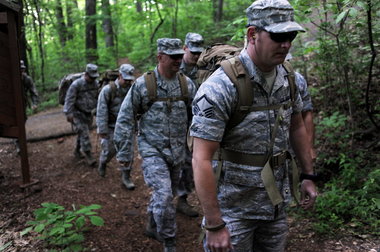 An Air Force Special Ops surgical and critical care team that is working at UAB trains at Ruffner Mountain earlier this week. Their backpacks carry instruments to set up a mobile operating room anywhere, including combat zones. (The Birmingham News/Tamika Moore)
An Air Force Special Ops surgical and critical care team that is working at UAB trains at Ruffner Mountain earlier this week. Their backpacks carry instruments to set up a mobile operating room anywhere, including combat zones. (The Birmingham News/Tamika Moore)On your average day, Dr. Jon Winkler and his team members at UAB Hospital seem like ordinary health-care workers pulling ordinary clinic shifts in the emergency room.
But at a moment's notice, they're ready to load their gear into a helicopter and jet and deploy their mobile trauma unit into battle. They're members of an Air Force Special Ops surgical and critical care team -- a far cry from the war medics of old.
The eight-person team can take measures even in the harshest environments to stabilize wounded troops and transport them to a field hospital. They carry what amounts to a mobile operating room in their backpacks, including lab tools, a ventilator, anesthesia and even IV fluids and blood.
"We're prepared for anything. We can set up anywhere," said Winkler, a lieutenant colonel and general surgeon who also leads what the military calls the SOST-SOCCET, for special operations surgical team and critical care evacuation team.
Unlike most Air Force teams, they're situated not on base but at the University of Alabama at Birmingham, where working on some of the hospital's trauma patients keeps their skills sharp.
The team, which includes an emergency surgeon, an orthopedic surgeon, nurses and technicians, is actually based out of Hurlburt Field in Florida. But because the hospital there isn't a Level 1 trauma center, the team members were getting a lot of experience doing routine hernia surgeries and appendectomies -- not what they'll see on the ground in combat.
At UAB, where they treat more victims of car accidents and gunshots, the injuries are a little closer to what they could experience in the field. They also found a willing partner in Jeffrey Kerby, a professor at UAB's medical school and a general surgeon at the hospital who was an Air Force trauma surgeon himself.
"They're supposed to be extra hands, but they've become critical to our clinical operations," Kerby said.
Most days, team members work regular shifts at the hospital, but about twice a month they're on call together as a trauma team. They get together once a week for Air Force training, hiking the trails at Ruffner Mountain Nature Preserve carrying their 35-pound medical packs or setting up their mobile OR. They also get weapons and evasion training, so they can get out of trouble if they need to.
They're not sure exactly what to prepare for. They've been sent to Haiti, where they did humanitarian care out of a tent on an airfield, and their office walls bear pictures from Iraq and Afghanistan. They have to be ready to handle delicate medical work in a makeshift hut, the middle of the desert, even the back of a C-130 transport jet, and they have to be able to do it without jeopardizing the safety of combat troops.
"Our job is to just do what's necessary to keep them alive and then get them transported to a high-level hospital where they can get all the care they need," Winkler said.
When they do go, they'll be missed at UAB, but they'll also have innovations to share in the long run, Kerby said. "If you look at the history of trauma care in the U.S., most of the advances have been in military conflict," he said. "Eventually it all gets back to a trauma care center."
Join the conversation by clicking to comment or email Wolfson at [email protected].


